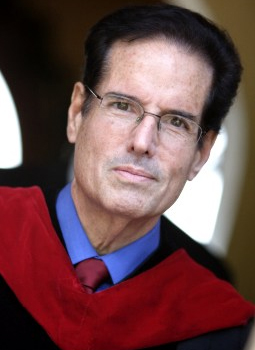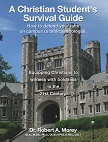THE COST OF DISCERNMENT!
By Dr. Robert A. Morey

Picture: Apostle Paul arrested, 1900s
The crowd joined in the attack against Paul and Silas, and the magistrates ordered them to be stripped and beaten. After they had been severely flogged, they were thrown into prison, and the jailer was commanded to guard them carefully. Upon receiving such orders, he put them in the inner cell and fastened their feet in the stocks. (Acts 16:16-24).
In an age in which discernment is viewed as a vice and gullibility as a virtue, there is a price to be paid if one decides to be “picky” about what to believe and how to live.
We are constantly told not to judge others but to be positive and accepting of all beliefs and lifestyles. “Something is true if you believe it” seems to be the greatest dogma of the 20th Century. This queer notion dominates much of the church as well as much of the world today.
The spirit of this age is a gullible spirit. This is the root reason why the cults are flourishing today and why gurus, psychics, channelers, self-proclaimed deities and messiahs are able to amass millions of dollars. It seems that the more ridiculous the belief, the more successful it becomes!
Those of us who have decided to swim against the tide of relativism that has engulfed our culture are made out to be the “bad guys.” We are told that it is “unloving,” “unkind,” “critical” and “conceited” to judge other people’s religious beliefs or practices. Of course, it would be “unkind” for us to point out to them that they are hypocrites because they are exactly doing what they are condemning us for doing! They are judging us in the name that it is wrong to judge!
This should not surprise us in the least. If we are the friends of God, the world will view us as its enemies (James 4:4). Discerning people are never as popular as the typical non-judgmental conformist who plays for the applause of the world. Indeed, Jesus warned us that too much popularity is a sign of being a false prophet (Lk. 6:26)!
In John 15:19, Jesus said that the world loves its own. This is why it is perfectly proper at a cocktail party to speak of one’s love for Maharishi Yogi, but it is not proper to speak of your love for Jesus Christ. Reincarnation is an acceptable topic but woe to that person who dares to bring up the subject of hell. As one Universalist-Unitarian said to me, “All religions are true—except yours.”
We accept the fact that since the world hated Jesus, it will hate us because we represent Him and His kingdom (John 15:18). This is part of the cost not only of apologetics but of Christian discipleship itself.
Because we know this, we are perfectly content to bear with “the slings and arrows of outrageous foes” in the world. We have even come to expect it. When someone gives us an encouraging word, it is like a breath of fresh air. But this does not happen too often. We have all been crucified many times over by bigoted humanists, cultists and occultists. It goes with the territory. The proverb, “If you can’t take the heat, you better stay out of the kitchen,” is most apropos for counter-cult evangelism.
But what we will never accept is the same kind of treatment by people in the church who should know better. I for one am quite tired of being rebuked by little old ladies who think that the Mormons are Christians because their church is called, “The Church of Jesus Christ of Latter-day Saints!” If I had a dollar for every time I have been told, “Judge not lest ye be judged,” I could retire to the Bahamas.
I remember one lady in Cape May, N. J. who came up after my lecture series on the cults and stated, “Why do you claim that the Mormons are false prophets? I asked the Mormon missionaries who live next to me if they were false prophets and they said, “No!” Aren’t you bearing false witness against them?” Evidently, gullibility has no limits!
We have all had countless experiences with ignorant people who think that “All roads lead to God,” “All truth is God’s truth,” “Everyone worships the same God under different names” and “All healing comes from God.” We bear patiently with them instructing them in the hope that God will grant them repentance unto the acknowledging of the truth (II Tim. 2:24-26).
But what can we say about all those pastors who oppose our work and think that they are doing God a favor by putting us down as “negative thinkers?” Educating their people about the cults is a waste of time to them. Money, buildings and numbers seem to be their only concern.
It is sad to say but most pastors are not interested in teaching their people to be discerning. Their sermons are often based on stories, jokes and illustrations. They tell their people to accept their doctrines “by faith.” They do not encourage in-depth Bible study. As one pastor told me, “You cannot have a big church and get too deep into the Bible or doctrine because you are bound to offend too many people and they will leave.” He was committed to shallow preaching as a principle!
These pastors can be as vicious as cultists. And when they get in charge of a Bible College or seminary, they will hunt down “unbelief” and root it out with a zeal that can only be equaled by the Inquisition. I was raised in a non-Christian home by a father who was an agnostic when sober and an atheist when drunk. I started reading philosophy while still in high school. After my conversion to Christ, I joined the most prominent evangelical church in New York City. I assumed that the pastor and Sunday school teachers would answer my questions. And, since I read constantly, I had lots of questions.
Now, I was not mean or nasty about issues. I just wanted to know WHY I was suppose to believe this or that doctrine. What was wrong with asking, “Where is this taught in the Bible?”
I soon ran into all kinds of trouble. I was told to “Let go and let God” have His way with me by accepting things by faith. Further I was counseled that a “spirit of unbelief” lay behind all my questions. Why couldn’t I be like everyone else and just accept what the pastor said? Why did I stir up trouble by asking questions? And why was I reading all those books? It was not normal to be so interested in the cults. What was a sixteen-year-old kid doing studying Greek and Hebrew?
The man who led me to Christ warned me that “much learning will make you mad.” It was dangerous to study theology, philosophy, the cults and the occult.
Finally, my pastor graciously told me that I should go to a Bible College where such questions could be answered. So, upon graduation from high school, I went to a Bible College. And boy, was I excited. At last I would find answers to my questions. Finally, I would be free to ask questions without someone accusing me of unbelief.
I wish I could tell you that my expectations were realized at this Bible College. But not only were my questions not answered, but I was severely condemned for the sin of asking questions which was rooted in the sin of intellectualism.
One student came up after our New Testament Introduction class in which I had asked the professor how to answer the arguments of form criticism, and said, “Bob, I hate you! Why do ask questions? You are getting everyone upset. Why can’t you just accept the truth without questioning it?”
I tried to explain that asking questions was the way I discovered the truth to accept. I had read much of liberal theology and I needed to know how to answer their arguments against the Bible. That is why I came to a Bible College.
Some of the professors simply did not have any answers and this caused some hard feelings. I was sent to see the Dean to try and work out the problem.
The Dean asked me, “Bob, have you ever asked Jesus to take away your questioning mind and to give you a believing heart instead? Are you willing to get on your knees right now and ask Jesus to take your mind away and give you a heart for God?” We got on our knees and prayed for Jesus to take my mind away and give me a heart instead.
It did not work. I could not stop asking WHY we should believe this or that. Like bubbles of air rising in water, the questions kept surfacing. I could not stop. I will never forget one chapel talk in which a professor took the text, “Open thy mouth wide and I will fill it,” and interpreted it to mean that we must accept without question what God has revealed through his teachers at the Bible College. He made all of us sit there with our mouths open during his talk!
Finally, I was brought before the President of the college who tried one last line of reasoning with me. He asked, “Bob, am I a man of God?” Of course, I had to answer, “Yes.” He responded, “Do I preach the Word of God by the power of God in the Spirit of God?” Again, what could I have answered but “Yes.”? “Then how can I be wrong? If I by the power of God preach the Word of God in the Spirit of God, how can I be wrong?” To this I had no answer but silence.
Even though I had not broken any rules and they admitted that I did not have a bad attitude, I was thrown out of that Bible College for the sin of asking too many questions.
I was forced to come to the conclusion that evangelical Christianity had no answers. Their doctrines were based on mysticism and a gullible spirit that accepted whatever the pastor or the professor said. A discerning spirit was not welcome in such circles. A questioning mind would not be tolerated. To ask questions would “rock the boat” and “make waves” -which is never allowed in such circles. Faith was an existential leap.
With a deep sense of disillusionment, I began to drift toward Neo-orthodoxy. The President had told me that he had never met anyone with a Ph.D. who loved God. The choice was set before me. If I wanted to love Jesus, then I could not think. If chose to think, I could not love Jesus!
I left that “Bible” College deeply hurt by my experience. Several of my friends who also got kicked out and left the Christian faith all together. One even became an atheist! But God had mercy on me and brought me into contact with discerning thinkers like Francis Schaeffer, Gordon Clark, Walter Martin and John Montgomery. Humanly speaking, I would have been lost to the evangelical church if it were not for them.
Schaeffer was willing to sit down and answer my questions. And he did not put me down for asking them. He came up with solid answers to my questions. I remember one time telling him with tears, “You mean that I not crazy for asking such questions? It is not wrong to wonder WHY? I can be a Christian and think at the same time?”
While I was delivered from apostasy, many students have been lost to the church forever. They could not take the anti-intellectualism and the gullible spirit that they found in far too many Evangelical circles. The lack of discernment has driven many thinking people out of the church.
I must ask WHY are so many Christians gullible? WHY is there such a lack of discernment today? WHY would anyone in his right mind buy into the “blab it-grab it” theology? WHY would someone claim to be an evangelical and at the same time openly deny the inspiration of Scripture, the miracles recorded in the Bible, the need to hear of and believe in Jesus for salvation and the reality of a conscious afterlife in heaven or hell? WHY are people still sending checks to PTL and Swaggart?
The following is a short list of some reasons why so many people are not discerning today.
- A misunderstanding of what Jesus meant when He said in Matt. 7:1, “Judge not, lest ye be judged.”
From Matt. 7:5 , it is clear that Jesus was rebuking HYPOCRITES who publicly condemn people for doing something that they themselves are doing in secret. Standing up and condemning someone for adultery while being engaged in an adulterous affair is what Jesus was condemning. Thus, the passage has nothing to do with the non-judgmental, positive-thinking relativism of today.
Later on in the same passage, Jesus tells us to judge certain kinds of people as being wild savage dogs and pigs (v.6). He even commands us to judge certain people as being false prophets (v.15).
In John 7:24, Jesus tells us to “judge with righteous judgment.” Indeed, no one could be baptized unless he was “judged” converted. No one could join a church unless he was “judged” qualified. Neither could there be any church officers without someone being “judged” as satisfying the requirements laid out in the Pastoral Epistles.
- A wrong understanding of “love.”
Modern “luv” cannot compare to the richness of biblical love. Sappy sentimentalism and a gullible spirit do not constitute true love. It is not loving to affirm deviant doctrines or life-styles.
Biblical love is sometimes confrontational and means that we will tell someone the truth even if it will make him our enemy (Eph. 4:25; Gal. 4:16). The truth will often offend people (I Cor. 1:18). It cannot be avoided.
- Assuming that something is true if you believe it.
Truth is made to conform to what we want it to be. It is subjectivized and relativized until it is no longer truth. This is the theme of the New Age. Everyone has his own truth!
But the Bible tells us to believe something if it is true. For example, Luke asks to believe in the bodily resurrection of Christ because there is convincing evidence to demonstrate that it is true (Acts 1:3).
- Assuming that personal piety guarantees doctrinal purity.
While I was doing a show on a prominent Christian TV network, I found that they were considering having a guest whom I knew to be a member of a large cult. When I pointed out the deviant doctrines of the man, the host replied, “You must be mistaken! He is too nice to be a heretic!” “ Niceness” does not guarantee truthfulness!
- They were never trained to check Scripture to see if something is true before they believe it (Acts 17:11).
It is the pastor’s job to train his people to be discerning (Eph. 4:12; Heb. 5:14). I love to preach in churches where I can hear the pages of Bibles being turned as people are looking up in Scripture to see if what I am saying is true. I love to see people taking notes. Their pastor has trained them well.
Just as the cults are the unpaid bills of the church, the lack of discernment today must be laid at the feet of the clergy. But they are victims too.
The Bible colleges and seminaries which trained them must share the blame. While there are a few exceptions, most pastors were never trained to be discerning. They were never encouraged to ask questions. Some kind of existential faith was pushed upon them. A mystical basis for faith cannot survive in apologetics. Is it any wonder that they themselves cannot discern truth from error?
Conclusion
The cost of discernment is high. You will not be the most popular guy in town. You will have to take your lumps as you expose heresy. You will have to endure the resulting anger of
people who do not want to be “judged.”
But the cost of being gullible is even higher for it pushes thinking people right out of the church! For the cause of God and Truth and the immortal souls of men, we must be discerning regardless of the cost.






































